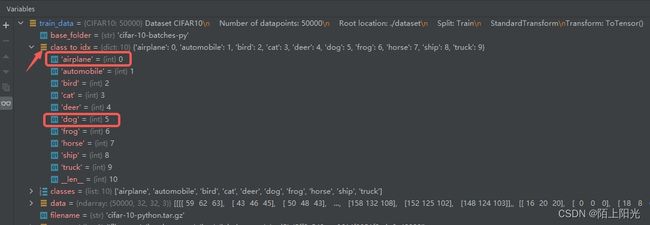学习pytorch20 pytorch完整的模型验证套路
pytorch完整的模型验证套路
- 使用非数据集的测试数据,测试训练好模型的效果
- 代码
- 预测结果
- 解决报错
B站小土堆pytorch学习视频 https://www.bilibili.com/video/BV1hE411t7RN/?p=32&spm_id_from=pageDriver&vd_source=9607a6d9d829b667f8f0ccaaaa142fcb
使用非数据集的测试数据,测试训练好模型的效果
测试:训练好的模型,提供对外真实数据的一个实际应用
从网上下载两张图片,整理图片的输入格式,输入模型测试模型效果


代码
import torch
from torch import nn
from torchvision import transforms
from PIL import Image
import cv2
dog_path = './images/dog.jpg'
airplane_path = './images/airplane.jpg'
model_path = './images/net_epoch9_gpu.pth'
dog_pil = Image.open(dog_path)
airp_pil = Image.open(airplane_path)
print(dog_pil) # 预测结果
tensor([[ 1.1317, -4.3441, 3.2116, 2.8930, 2.6749, 4.6079, -3.2860, 3.1357,
-3.0432, -4.1703]])
tensor(5)
tensor([5])
tensor([[ 5.5993, -0.6140, 4.4758, 0.8463, 1.6311, -1.0217, -3.9990, -2.8343,
1.1050, -1.6423]])
tensor([0])
预测结果和训练数据的标注一直,预测正确
解决报错
RuntimeError: mat1 and mat2 shapes cannot be multiplied (64x16 and 1024x64)
解决: dog_tensor = dog_tensor.reshape((1, 3, 32, 32)) 转换输入是4维的, 模型输入有一个batch-size维度
RuntimeError: Attempting to deserialize object on a CUDA device but torch.cuda.is_available() is False. If you are running on a CPU-only machine, please use torch.load with map_location=torch.device(‘cpu’) to map your storages to the CPU.
解决:model = torch.load(model_path, map_location=torch.device(‘cpu’))
在gpu上训练的模型,要在cpu上测试,模型加载的时候指定cpu设备

